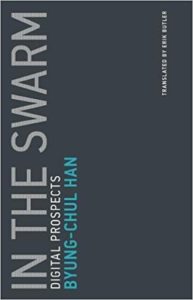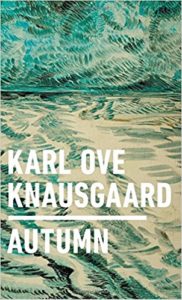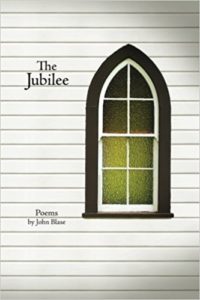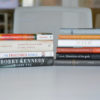Every once in a while, I give a report here on what I’m currently reading. Keep in mind; this is not (necessarily) an endorsement of these books, just a note on what’s on my nightstand at the moment.
These are some of the books I’ve been reading since my last report.
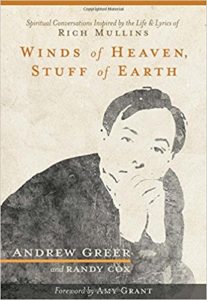
Andrew Greer and Randy Cox
I picked up this new book after attending a concert at the Ryman Auditorium here in Nashville, put together and led by my friend Andrew Peterson, celebrating the life and legacy of Rich Mullins. This book was referenced at the event and I’ve been reading through it. Fellow Mullins fans will find reflections on his life and art by people who knew and performed with him. It is interesting to contemplate what—twenty years after his death—Mullins would have been up to in 2017, and what he would have thought of contemporary American evangelical culture.
Cheap Sex: The Transformation of Men, Marriage, and Monogamy
Mark Regnerus
Reading this book gave me flashbacks to reading Ray Ortlund’s book, Whoredom, many years ago, neither of which I felt comfortable reading on a plane. This book, like Ortlund’s, is excellent. Regnerus applies an economic model to his sociological data on what’s happening to marriage. He does not shy away from very difficult truths about the scene before us. The last chapter includes his predictions for the future and is for the most part jarring although convincing. If you do any sort of ministry at all (and all of us should be), you will want to reference this book.
In the Swarm: Digital Prospects
Byung-Chul Han
This short little philosophical reflection on digital culture is mind-changing and mind-blowing. Han addresses such topics as anonymity in social media concluding, “Respect is tied to names. Anonymity and respect rule each other out.” He also expertly deconstructs social media outrage by noting that it cannot be sung. Referencing the Iliad, he argues that rage “can be sung.” He further argues, “digital outrage cannot be sung. It admits neither action nor narration. Instead, it is an affective condition devoid of the power to act.” Let he who has an ear, let him hear.
I first started reading this author with his multivolume autobiographical series, My Struggle, after hearing it recommended on Brian Koppelman’s The Moment podcast. I couldn’t imagine that I could find something as long and as seemingly mundane as an autobiography translated into English to be appealing, but Koppelman was right. Knausgaard often provides jarring insights into the human condition. This is the first in a series of books related to the seasons, and happens to start with my favorite of the seasons. The author writes, from the very beginning, a letter to his unborn daughter about the mysteries of human existence. It is, so far, a life-affirming and inspiring reflection.
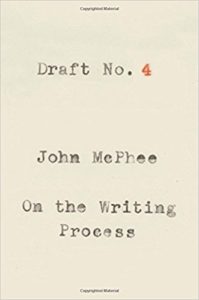
Draft No. 4: On the Writing Process
John McPhee
I love to read books about writing when they are done well such Anne Lamott’s Bird by Bird or Stephen King’s On Writing. This book was especially appealing to me because it lays out McPhee’s process. I am writing a book right now and I tend to hate my writing all the way through to the very end. At several points, I always consider scrapping the entire project; I am at that moment now. McPhee’s book is a reminder that this is just how writing works.
 World Without Mind: The Existential Threat of Big Tech
World Without Mind: The Existential Threat of Big Tech
Franklin Foer
I tend to be wary of jeremiads against technology for the same reasons that I tend to be skeptical of many evangelical end times prophecy books. I picked up this volume because of my interest in the drama which took place several years ago when Foer resigned as editor of The New Republic in protest of the new owner’s quest to turn the venerable old magazine into a digital media vehicle. Some of this book is overheated, much of it understandably the result of personal rage at the situation he endured. But there is much food for thought here, too. The most interesting part of this book to me is Foer’s reflection about how he drifted back from a Kindle to the printed page. I found myself going through the exact same process. It wasn’t a conscious choice to return to the printed page, it just seemed to happen. I also appreciated Foer’s discussion of the need for solitude in order to provide the creativity needed for community. This is a conviction I’ve long had, and one that grows stronger with me all the time. I usually, as I said, read print books these days but, ironically enough, this is the only book on this list I read on an iPad.
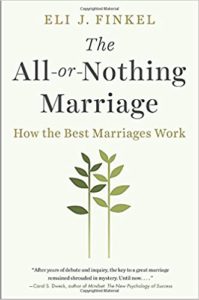
The All-or-Nothing Marriage: How the Best Marriages Work
Eli J. Finkel
I have just begun this book and will be interested to see the recommendations the author makes for what he calls “lovehacks,” on improving marriage. I expect to find parts at which to agree, and I also expect to find myself arguing with the page.
John Blase
I cannot remember where I saw this collection of poems referenced in recent days, but intrigued upon learning of it, I ordered it immediately and have begun reading them. So far, I find his poetry moving and look forward to completing this volume.

J.R.R. Tolkien
As I’ve mentioned before, I usually pick one book that has meant something to me in the past to re-read slowly, and force myself to read it slowly across several months. Last year I re-read Brothers Karamazov this way; This year, I am re-reading Tolkien’s Lord of the Rings saga. I am already, despite only being a couple of chapters back in, startled by how much I had forgotten and how much seems to be brand new to me, even though I’ve probably read this book three times since I was ten or twelve years old.




